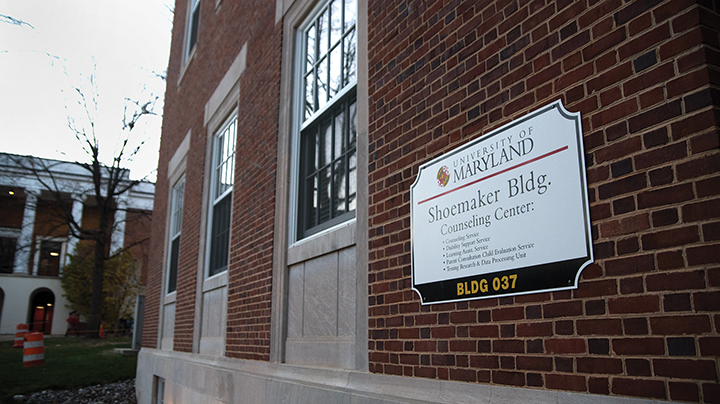The University of Maryland’s Counseling Center will hire four full-time psychologists to address a demand for more mental health resources on the campus, a university official said.
Three of the positions were newly created and the fourth fills a vacancy, Student Affairs Vice President Linda Clement said on Friday. The new posts come in response to an increasing need for campus mental health services, and resources were redirected to add the additional positions, she added.
“I want everybody to know that if people are having a crisis or emergency, they can be seen,” Clement said. “There certainly are longer waits for people that have less severe conditions. Anybody with an emergency — we need to see them in the Counseling Center.”
[Read more: This student group says counseling comes “30 days too late” at UMD]
The center’s overall full-time employee count dipped due to budget cuts in fiscal 2015, according to a 2015-16 Counseling Center report. Of the total additional funds used to bolster campus counseling and mental health services, $100,000 is new this year from alcohol sales at Maryland Stadium and Xfinity Center, Clement said, and the remaining $450,000 comes from a campus contract with Pepsi that is in its third year.
In June 2015, university President Wallace Loh pledged in a campuswide email that an estimated $500,000 per year from alcohol revenues would be set aside for mental health counseling, sexual assault prevention and alcohol education programs for university students.
“We’ve had a couple retirements in our learning assistance center, and so we were able to take those positions and redirect the funding, and then, over the last couple of years, we’ve received additional funding, money from a grant from the Pepsi corporation, and we also have committed funds, going into this year and moving forward, to profits from the sale of alcohol in the stadium,” Clement said.
The new positions follow a rise in student activism for greater mental health resources on the campus. Scholars Promoting and Revitalizing Care — a group formed by College Park Scholars students in 2015 — seeks to boost these resources. On Feb. 14, it launched its “30 Days Too Late” campaign, which was named to reflect the amount of time it can take to receive a Counseling Center appointment following the initial intake.
“This is a step in the right direction,” said Alyssa Schledwitz, SPARC’s vice president and a senior physiology and neurobiology major. “I like to think that we were at least part of the impetus that led to this. It’s really heartening to see that administration is taking into consideration the concerns of students and how understaffed the Counseling Center is right now.”
[Read more: UMD’s counseling center saw an increase in appointments following hate bias incidents]
Clement said “there’s not a standard amount of wait time” for receiving an appointment, and this shouldn’t be thought of as a “static thing.”
“If somebody’s got a severe situation and they need to see somebody, they will have no wait times,” she said. “If it’s determined to be a less severe situation, they may have a longer wait period, particularly during those two times in the semester — midterms and finals — when we seem to have the most demand. … Everyone is seen immediately for intakes, which is a period of diagnosis, and that’s important.”
Clement pointed to other resources that have been put in place this academic year for undergraduate and graduate students. The center began offering 12 workshops — composed of between four and 12 students and facilitated by psychologists — for students with anxiety and depression, and an online counseling alternative that began “within the last couple weeks,” Clement said.
“We’re trying all types of delivery modes to try and meet the demand,” she said.
The center hopes to hire the new psychologists “immediately” out of the current search pool, Clement said, adding that the search likely won’t start until the end of this semester but should be in place for next academic year.
“We think that having more staff is certainly going to cut down the wait time for people, and also just alleviate the stress on our staff,” Clement said.



